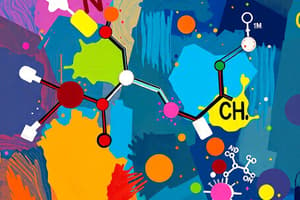Podcast
Questions and Answers
Which drug listed is indicated for antacid use?
Which drug listed is indicated for antacid use?
- Paracetamol
- Maalox (correct)
- Ceelin
- None of the above
What is the pH range of Maalox?
What is the pH range of Maalox?
- 3 - 4
- 7 - 8
- Approximately 8 (correct)
- 5.5 - 6.5
Which drug is recommended not to be taken for fever for more than 3 days unless directed by a doctor?
Which drug is recommended not to be taken for fever for more than 3 days unless directed by a doctor?
- Paracetamol (correct)
- Maalox
- Ceelin
- None of the above
Which drug is indicated for vitamin C supplementation?
Which drug is indicated for vitamin C supplementation?
What is the indication for Paracetamol?
What is the indication for Paracetamol?
What precaution should be taken when acid problems persist or worsen after using a product for 1 week?
What precaution should be taken when acid problems persist or worsen after using a product for 1 week?
Which drug is used to treat symptoms of too much stomach acid such as heartburn and acid indigestion?
Which drug is used to treat symptoms of too much stomach acid such as heartburn and acid indigestion?
What is the pH range of Paracetamol?
What is the pH range of Paracetamol?
Which drug interaction is NOT mentioned in the text for Paracetamol?
Which drug interaction is NOT mentioned in the text for Paracetamol?
What is the primary indication for Maalox?
What is the primary indication for Maalox?
Which factor is NOT considered in drug design according to the text?
Which factor is NOT considered in drug design according to the text?
What is the primary direction for use of Ceelin?
What is the primary direction for use of Ceelin?
Which chemical property is NOT emphasized in the context of drug formulation?
Which chemical property is NOT emphasized in the context of drug formulation?
Which molecular interaction is crucial for drug stability but not explicitly mentioned in the text?
Which molecular interaction is crucial for drug stability but not explicitly mentioned in the text?
Study Notes
Organic Chemistry and Pharmacy
- Organic chemistry is the study of carbon and its compounds, and is a key driver in the drug discovery process.
- Organic compounds are the primary constituents of all living organisms.
- The role of organic chemistry in pharmacy is changing due to new synthetic methods and technologies.
Characteristics of Organic Compounds
- Non-polar compounds that do not dissolve in polar solvents.
- Have low melting points.
- React slower than ionic compounds.
- Highly flammable.
- Low boiling points.
Carbon
- Located in Group 4A and Period 2 of the periodic table.
- Can form 4 covalent bonds with other carbon or elements.
- Can form a maximum of four bonds.
- Often combined with H, and bonds with S, O, N, and P.
Comparison of Organic and Inorganic Compounds
- Organic compounds: generally not soluble in water, soluble in organic solvents, non-conductive, flammable, and have low boiling points.
- Inorganic compounds: soluble in water, insoluble in organic solvents, conductive, not flammable, and have high boiling points.
Acids, Bases, and Neutrals
- Acids: pH < 7, react with metals and bases, taste sour, and contribute H+ ions to a solution.
- Bases: pH > 7, do not react with metals, taste bitter, and contribute hydroxide ions to a solution.
- Neutrals: pH = 7, neither acidic nor basic, and can be neutralized by an acid or base.
pH Determination
- Indicators are substances that change color in the presence of an acid or base.
- Examples of indicators include litmus, phenolphthalein, methyl orange, and methyl yellow.
- pH meters are used to measure the acidity or basicity of an aqueous solution.
Drug Acid/Base Equilibria
- The acid/base character of drugs affects their biopharmaceutical properties and formulation.
- Important factors influenced by acid/base character include:
- Formulation: solubility, complexation, partitioning, osmolarity, and chemical stability.
- Biopharmaceutics: permeability, absorption, distribution, metabolism, excretion, and toxicity.
- Drug design: biological activity, receptor interactions, ligand efficiency, drug-likeness, and off-target activity.
Importance of pH in Pharmacy
- pH affects how drugs behave and interact with the body.
- Examples of drugs and their pH ranges:
- Paracetamol: 5.5-6.5
- Maalox: approximately 8
- Ceelin: unknown
Studying That Suits You
Use AI to generate personalized quizzes and flashcards to suit your learning preferences.
Description
Prepare for the preliminary exam on Organic Chemistry with this lab reviewer for Pharmaceutical Organic Chemistry. Topics include organic compounds, carbon and carbon compounds.




